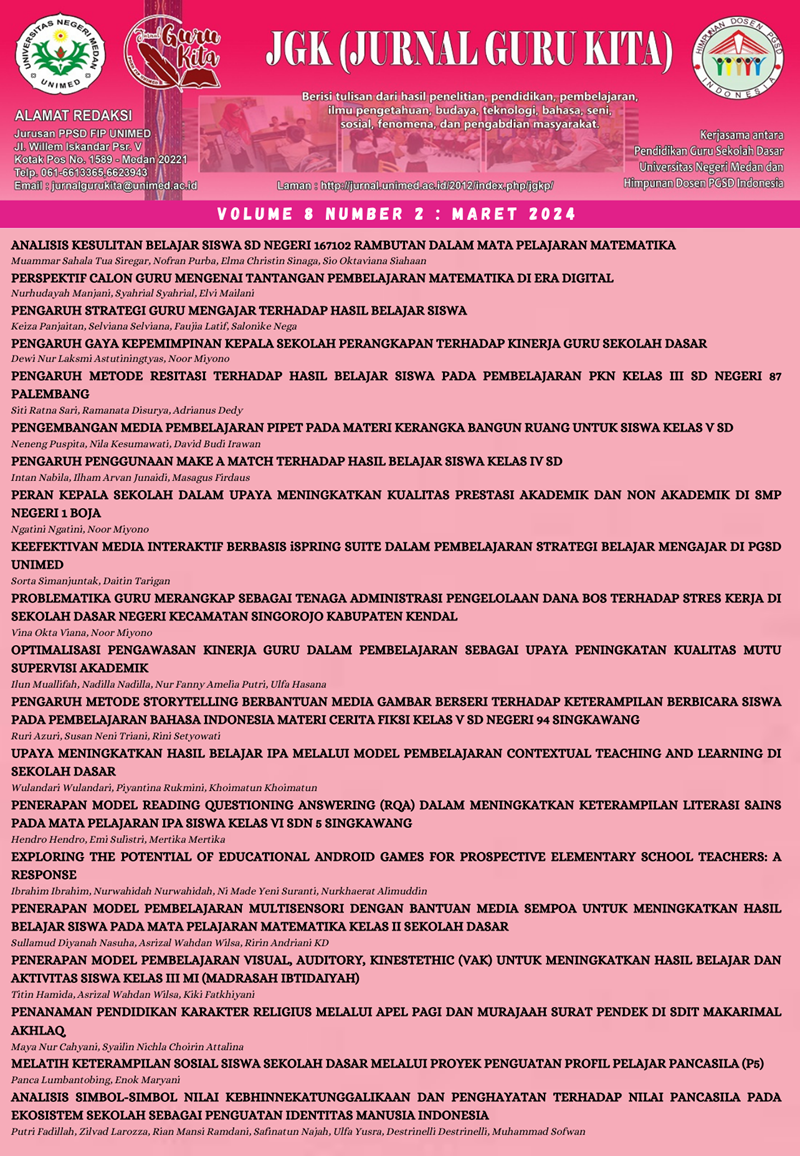EXPLORING THE POTENTIAL OF EDUCATIONAL ANDROID GAMES FOR PROSPECTIVE ELEMENTARY SCHOOL TEACHERS: A RESPONSE
DOI:
https://doi.org/10.24114/jgk.v8i2.56553Keywords:
Games, Android, Prospective Elementary School Teacher, ResponseAbstract
This research aims to explore the responses of prospective elementary school teachers to training in developing Android-based educational games as an innovative learning tool. By distributing questionnaires to 121 prospective elementary school teachers in NTB, this research identified the needs, interests, motivations and challenges faced in participating in the training. The research results show that prospective elementary school teachers show a high interest in using educational games as a learning tool, but prospective elementary school teachers face challenges related to technical skills and integration in the curriculum. These findings provide important insights for training providers in designing programs that better suit the needs of prospective teachers, as well as highlighting the importance of continued support for the development of skills in using technology in education.References
Abesadze, S., & Nozadze, D. (2020). Make 21st century education: The importance of teaching programming in schools. International Journal of Learning and Teaching, 6(3), 158-163. http://dx.doi.org/10.18178/ijlt.6.3.158-163
Bahtiar, B., Ibrahim, I., & Maimun, M. (2022). Analysis of Students' Scientific Literacy Skill in terms of Gender Using Science Teaching Materials Discovery Model Assisted by PhET Simulation. Jurnal Pendidikan IPA Indonesia, 11(3), 371-386. https://doi.org/10.15294/jpii.v11i3.37279
Bahtiar, B., Yusuf, Y., Doyan, A., & Ibrahim, I. (2023). The Trend of Technology Pedagogical Content Knowledge (TPACK) Research in 2012-2022: Contribution to Science Learning of 21st Century. Jurnal Penelitian Pendidikan IPA, 9(5), 39-47. https://doi.org/10.29303/jppipa.v9i5.3685
Care, E., Kim, H., Vista, A., & Anderson, K. (2018). Education System Alignment for 21st Century Skills: Focus on Assessment. Center for Universal Education at The Brookings Institution.
Chalkiadaki, A. (2018). A systematic literature review of 21st century skills and competencies in primary education. International Journal of Instruction, 11(3), 1-16. http://dx.doi.org/10.12973/iji.2018.1131a
Erfan, M., Suranti, N. M. Y., & Ibrahim, I. (2024). The Development of an Ethnopedagogical LMS to Enhance the Creativity of Elementary School Teacher Candidates in Learning Science Course. Jurnal Penelitian Pendidikan IPA, 10(2), 886-895. https://doi.org/10.29303/jppipa.v10i2.6265
Hung, C. Y., Sun, J. C. Y., & Liu, J. Y. (2019). Effects of flipped classrooms integrated with MOOCs and game-based learning on the learning motivation and outcomes of students from different backgrounds. Interactive Learning Environments, 27(8), 1028-1046. https://doi.org/10.1080/10494820.2018.1481103
Lampropoulos, G., Keramopoulos, E., Diamantaras, K., & Evangelidis, G. (2022). Augmented reality and gamification in education: A systematic literature review of research, applications, and empirical studies. applied sciences, 12(13), 6809. https://doi.org/10.3390/app12136809
Litvinenko, V. S. (2020). Digital economy as a factor in the technological development of the mineral sector. Natural Resources Research, 29(3), 1521-1541. https://doi.org/10.1007/s11053-019-09568-4
Loderer, K., Pekrun, R., & Lester, J. C. (2020). Beyond cold technology: A systematic review and meta-analysis on emotions in technology-based learning environments. Learning and instruction, 70, 101162. https://doi.org/10.1016/j.learninstruc.2018.08.002
Malik, R. S. (2018). Educational challenges in 21st century and sustainable development. Journal of Sustainable Development Education and Research, 2(1), 9-20. https://doi.org/10.17509/jsder.v2i1.12266
Maulidia, L. N., Suparno, S., & Rosyidah, U. J. (2023). A Systematic Literature Review on Technology-Based Learning Media in ECE to Face Society 5.0 Era. Jurnal Obsesi: Jurnal Pendidikan Anak Usia Dini, 7(5), 5181-5195. https://doi.org/10.31004/obsesi.v7i5.4997
Mayasari, M., Mayasari, D., Anitra, R., & Ibrahim, I. (2024). Hubungan Motivasi Belajar Siswa dengan Hasil Belajar Kognitif IPA Siswa Kelas V SDN 11 Singkawang Tahun Ajaran 2022/2023. Jurnal Ilmiah Profesi Pendidikan, 9(1), 546-557. https://doi.org/10.29303/jipp.v9i1.2054
Partovi, T., & Razavi, M. R. (2019). The effect of game-based learning on academic achievement motivation of elementary school students. Learning and Motivation, 68, 101592. https://doi.org/10.1016/j.lmot.2019.101592
Passarelli, M., Dagnino, F. M., Earp, J., Manganello, F., Persico, D., Pozzi, F., ... & Haggis, M. (2019). Educational games as a motivational tool: Considerations on their potential and limitations. https://doi.org/10.5220/0007586503300337
Remler, D. K., & Van-Ryzin, G. G. (2021). Research methods in practice: Strategies for description and causation. Sage Publications.
Yu, Z., Gao, M., & Wang, L. (2021). The effect of educational games on learning outcomes, student motivation, engagement and satisfaction. Journal of Educational Computing Research, 59(3), 522-546. https://doi.org/10.1177/0735633120969214
Zahroh, U., Rachmawati, N. I., Darmayanti, R., & Tantrianingrum, T. (2023). " Guidelines" for collaborative learning in 21st century education at Madrasah Tsanawiyah. Assyfa Journal of Islamic Studies, 1(2), 1-15. https://doi.org/10.61650/ajis.v1i2.239
Downloads
Published
How to Cite
Issue
Section
License
Copyright (c) 2024 Ibrahim Ibrahim, Nurwahidah Nurwahidah, Ni Made Yeni Suranti, Nurkhaerat Alimuddin

This work is licensed under a Creative Commons Attribution-ShareAlike 4.0 International License.
Authors published with the JGK (Jurnal Guru Kita) agree to the following terms:
- Authors retain copyright and grant the journal the right of first publication with the work simultaneously licensed under a Creative Commons Attribution License (CC BY-SA 4.0) that allows others to share the work with an acknowledgment of the work's authorship and initial publication in this journal.
- Authors are able to enter into separate, additional contractual arrangements for the non-exclusive distribution of the journal's published version of the work (e.g., post it to an institutional repository or publish it in a book), with an acknowledgment of its initial publication in this journal.
- Authors are permitted and encouraged to post their work online (e.g., in institutional repositories or on their website) prior to and during the submission process, as it can lead to productive exchanges, as well as earlier and greater citation of published work. (See The Effect of Open Access)


























